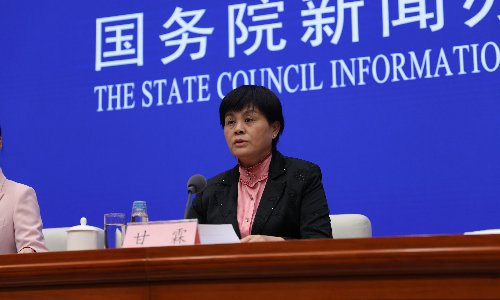
Gan Lin, vice-minister of the State Administration for Market Regulation, introduces China's anti-monopoly law at a press conference in November 2018. (Photo: VCG)
Companies that reach monopoly agreements in the Chinese market will face penalties of up to 10 percent of their revenue in the previous year, according to a draft regulation released for public comment by the State Administration for Market Regulation (SAMR) on Thursday.
When anti-monopoly law enforcement officers find market participants are disturbing market order through such agreements, they can order such actions to stop, confiscate illegal gains, and impose fines ranging from 1 percent to 10 percent of the prior-year revenues of the parties involved.
Those that have already formed a monopoly agreement but have yet to put their intent into action will face fines of up to 500,000 yuan ($72,750), according to the draft regulation.
Public comment on the draft regulation will be accepted until February 3, according to a statement posted on the website of the SAMR.
China has vowed to better coordinate anti-monopoly law enforcement to preempt and contain actions resulting from monopolistic agreements.
The draft regulation also specifies that monopolistic agreements reached outside of China that have caused distortions in the Chinese market will be subject to its jurisdiction.
Monopolistic agreements refer to agreements, decisions or coordinated actions that contain and limit market competition. Such agreements can be in written or oral form. This category also includes agreements affecting pricing and the supply chain, or banning the signatories from investing in new technologies or using new equipment.
Companies that seek to exert pressure on specific suppliers, products and services will also be held accountable.
Any entity or individual in China can report malpractice relating to monopolistic agreements, according to the draft regulation.
"The clause concerning extraterritorial jurisdiction is in line with international norms and previous rulings by Chinese anti-monopoly authorities," Huang Yong, a professor of antitrust law at Beijing-based University of International Business and Economics, told the Global Times Thursday.
Huang said the draft regulation is a detailed step in the legal work of anti-monopoly efforts by the Chinese authorities.
In 2014, the National Development and Reform Commission imposed 1.2 billion yuan ($201 million) fines on 12 Japanese auto parts suppliers for colluding to manipulate prices in China through their monopolistic agreement.


